Research, Innovation and Organization (RIO) Group
Archive
David Howoldt and Lasse Bundgaard completed their PhD in 2021
David Howoldt submitted his thesis entitled: Policy Instruments and Policy Mixes for Innovation. Analysing Their Relation to Grand Challenges, Entrepreneurship and Innovation Capability with Natural Language Processing and Latent Variable Methods. He defended his thesis 15 December 2021.
| Primary Supervisor | Professor Susana Borrás |
| Secondary Supervisor | Professor Christoph Grimpe, Department of Strategy and Innovation, Copenhagen Business School |
| Assessment Committee | Professor Alan Irwin (Chair); Professor Maryann Feldman, Department of Public Policy, University of N. Carolina at Chapel Hill: Professor Kieron Flanagan, Alliance Manchester Business SchoolUniversity of Manchester. |
Lasse Bundgaard submitted his thesis entitled: Public Private Innovation Partnerships: Creating Public Value & Scaling Up Sustainable City Solutions. He defended his thesis September 17, 2021.
| Primary Supervisor | Professor Susana Borrás |
| Secondary Supervisor | Associate professor Jasper Hotho, Department of International Economics, Government, and Business, Copenhagen Business School |
| Assessment Committee | Professor Carsten Greve; Senior researcher Maria-Theresa Norn, Aarhus University; Professor Tamyko Ysa, ESADE |
Jane Bjørn Vedel receives prestigious grant
Associate Professor Jane Bjørn Vedel has received a Carlsberg Foundation Young Researcher Fellowship grant of DKK 4,936,026 for the project “The implications of large-scale grants for the university as an institutionalized organization.” The project explores the organizational consequences of large-scale grants – both how large-scale grants potentially allow organizations (through researchers) to engage in research with longer time horizons but also how large-scale grants potentially create siloed organizations and change research, career, and education practices. Jane will visit Stanford University during the project.
Congratulations Lars Oehler, PhD!
On 15 April 2021 RIO member and PhD Fellow Lars Oehler successfully defended his PhD Thesis entitled: Technological Change and the Decomposition of Innovation: Choices and Consequences for Latecomer Firm Upgrading. The Case of China's Wind Energy Sector. The defense took place over Teams and was widely attended by colleagues, friends, and family from many places around the world. Congratulations!
Dr. Oehler has embarked on a new professional opportunity at KfW DEG, a development finance institution, where he structures, monitors, and evaluates sustainability projects in developing and emerging countries as part of the develoPPP initiative set up by the German Federal Ministry for Economic Cooperation and Development. We wish Dr. Oehler the best in this new journey!
Below is a short abstract, as well as information on the supervisory and assessment committees. The thesis is available from research.cbs.dk.
Technological Change and the Decomposition of Innovation: Choices and Consequences for Latecomer Firm Upgrading. The Case of China's Wind Energy Sector.
Technological change associated with the green and digital transformation is radically transforming previous forms of industrial organization. This dissertation analyzes how these changing conditions in the global economy affect the development of latecomer firms. Drawing on the empirical case of latecomer firms in China’s wind energy sector, the overarching research question guiding this thesis is: what consequences do technological change and the decomposition of innovation have for the upgrading of innovation capabilities in latecomer firms? The thesis contributes to the literatures on catching up, technological learning, and the upgrading of innovation capabilities in emerging market firms and speaks to the broader debates on economic development and industrial upgrading in an era of technological change.
| Primary Supervisor: |
Associate Professor Stine Haakonsson Department of Organization Copenhagen Business School |
| Secondary Supervisors: |
Professor Liu Xielin School of Economics and Management University of the Chinese Academy of Sciences
Professor Susana Borrás Department of Organization Copenhagen Business School |
| Assessment Committee: |
Professor Ari Kokko (Chair) Department of International Economics, Government and Business Copenhagen Business School
Professor Roberta Rabellotti Department of Political and Social Science University of Pavia
Professor Teis Hansen Department of Food and Resource Economics University of Copenhagen
|
RIO group work featured in EU-SPRI Early Career Research (ECR) Webinar Series
Two RIO members – David Howoldt and Aixa Alemán-Díaz- are featured speakers in the inaugural EU-SPRI Early Career Research (ECR) Webinar Series launched in April 2021. David gave his talk entitled Characterizing Innovation Policy Mixes in Innovation Systems on 15 April 2021. Aixa will give hers entitled National Science and Innovation Policy: between Curiosity, Market and Mission on 20 May 2021. Below you can find abstracts for their talks and details on how to register to participate:
Characterizing Innovation Policy Mixes in Innovation Systems David Howoldt
Along with increases in the economic relevance, scope and complexity of innovation policy, attention to the concept of the innovation policy mix has surged. Yet, we have limited knowledge about how innovation policy mixes relate to innovation systems. In this paper, I present a new approach to mapping innovation policy mixes and analyze how the prevalence of key elements in these mixes is associated with different aspects of innovation system performance. Moreover, I consider how structural and institutional country characteristics affect this relation. Based on expert survey data on 4.500 policies, my results indicate positive associations between policies for the research system and scientific output, and between policies for private sector innovation and technological output. They indicate that associations between policies for developing the innovation system and aspects of innovation system performance are mixed. My results also suggest that dynamics between different governance levels play into the design of innovation policy mixes. These findings advance the debate about the factors influencing innovation policy design and demonstrate the usefulness of a novel dataset and natural language processing methods for innovation policy studies.
National Science and Innovation Policy: between Curiosity, Market and Mission Aixa Alemán-Díaz
What determines the distribution of national public funding for science and innovation (S&I)? While the literature has described a move towards “mode 2,” with strong focus of applied science and user-involvement, there are also voices emphasizing the value of basic science and “Nobel Prizes”. We trace the changing balance between such ideas in selected national S&I policies. Proposing an analytical framework outlining three ideas about what research should be driven by - “curiosity”, “market”, or “mission” - we analyze their presence over time in selected national S&I policies in the US, China and Denmark in the years 2003-2020. By analyzing 14 national S&I documents, we identify similarities and differences in the presence and influence of these ideas. We also point to inner tensions and changes within each set idea. Contrary to what is often predicted in the literature, we find a co-existence and mutual influence of these ideas over time. We discuss the dynamics behind these patterns and what the implications are for national S&I strategies and public policy. We also contribute to the theoretical understanding of these ideas by proposing the term “isomorphic difference” to capture the simultaneous spread and translation of ideas across contexts
The ECR Webinar Series takes place on the third Thursday of every month until June 2021. The series is free but it requires registration in advance: https://www.eventbrite.co.uk/o/eu-spri-32734753421
The “European Forum for Studies of Policies for Research and Innovation” (Eu-SPRI Forum) aims to strengthen the vibrant but dispersed interdisciplinary community of researchers focusing on interdisciplinary dimensions related to policy and governance in the field of knowledge creation and innovation. The Eu-SPRI Forum was founded in Paris in June 2010.
RIO group work published in Research Policy
Assistant Professor Jane Bjørn Vedel, Professor MSO Signe Vikkelsø, Professor Alan Irwin
(Please check publication links below)
Researcher Julia Kirch Kirkegaard, Department of Wind Energy, DTU (and post doc at IOA/CBS)
New Project: Controversies in the green transition: The case of wind turbine sound and its politicisation (Co-Green)
This project aims to further our understanding of how controversies over green transitions are exacerbated by a technical framing of the green transition and its solutions. Such disengagement of the green transition from politics through “technification” paradoxically leads to politicization and controversy. To examine this, we focus on wind power development, in particular how the matter of wind turbine sound becomes constituted as contestable ‘noise’. Informed by Science & Technology Studies, we explore the various existing forms of knowledge about wind turbine sound. Based on this, we examine how wind turbine sound is politicized in specific wind farm projects. This informs our experimentation with co-creation workshops, to explore how different forms of knowledge of sound can reach consensus. The project contributes to the field of Science Communication by coupling it with transition and social acceptance studies and to controversy studies by combining it with co-creation theory.
Phd Fellowship position: Deadline 8 March, 2021. Apply here
Read more about the new project (TBA)
Read more about another project that Julia Kirch Kirkegaard is also part of at IOA/CBS here (i.e. Green transition through dynamics of problematizations: How forms of expertise influence the financial and social valuation of energy resources in Denmark)
Associate Professor Stine Jessen Haakonsson and Professor Susana Borras
New Project: Public Actors’ Capacities in the Governance of Green Transitions (CAPACITOR)
Public actors (like municipalities, national agencies, public utilities) have been entrusted to reduce CO2 emissions, and are taking the lead in the governance of green transitions. However, the governance of green transitions is complex (coordinating many stakeholders, creating market and institutional contexts for investments, adapting standards and safety regulations, etc.). Hence, public actors need organizational capacities. CAPACITOR project asks, How are public actors developing and using their organizational capacities in the complex governance processes of green transitions? And, What specific combinations of public actors’ capacities are required for achieving green transitions? We will compare 24 in depth cases in the energy and maritime transport sectors, collecting data from 250+ interviews, 24 observations, and 450+ documents. The findings will help developing a theory on public actor’s organizational capacities for green transitions, and identifying deficiencies in current capacities.
Professor Susana Borras' book: Holistic Innovation Policy
Professor Alan Irwin's research grant: 'Isomorphic Differences: Familiarity and Distinctiveness in National Science and Innovation Policies'
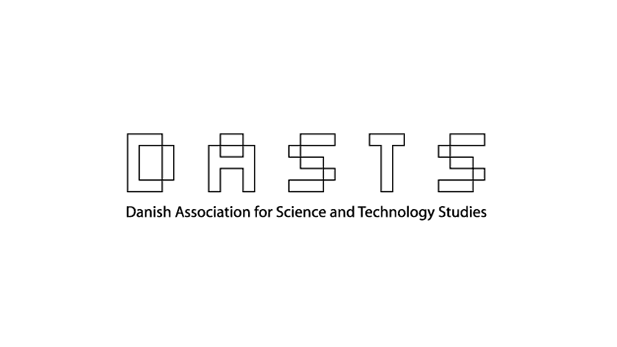
DASTS Annual Meeting postponed
Due to the Corona virus, the organizing team for the 2020 meeting has decided to cancel the DASTS conference originally scheduled to be held at CBS, May 14-15, 2020. Please note that the DASTS are currently exploring opportunities for postponing the conference one year until 2021, if possible, in coordination with the Nordic STS conference. We will post information as soon as further details are available.
SAVE-THE-DATE: Annual meeting of the Danish Association for Science and Technology Studies (DASTS) at CBS on May 14-15, 2020
This year CBS’s Department of Organization will be hosting the annual meeting of the Danish Association for Science and Technology Studies (DASTS). The conference theme is STS and the Future as a Matter of Collective Concern. The event will take place May 14-15 2020 at Copenhagen Business School. RIO Member Jane Bjørn Vedel is part of the organizing committee for this meeting. Further details can be found here

Science Democracy Network Annual Meeting postponed
In response to the corona virus pandemic, the Science Democracy Network annual meeting originally scheduled from 24-27 June 2020 at the Copenhagen Business School has been be postponed until further notice. The situation remains very fluid and organizers have decided to wait for the dust to settle before deciding how to go forward. A new date and venue, as well as a new deadline for abstract submissions, will be announced as soon as they are known.
CALL FOR ABSTRACTS: Science and Democracy Network 19th Annual Meeting at CBS on 24-27 June 2020
RIO members Alan Irwin, Aixa Y. Alemán-Díaz and Jane Bjørn Vedel are working with colleagues at Harvard University to organize the upcoming Science and Democracy Network annual meeting from 24-27 June 2020. The meeting will take place at the Copenhagen Business School (CBS).
The event draws international scholars in the field of science and technology studies (STS) and seeks to develop strong connections with an emerging international network of scholars working on issues of science, technology and democratic governance around the world. Please note:
- Call for Abstracts has been issued (see specifics here). Deadline is 27 March 2020.
- There will be a graduate student session on Wednesday, 24 June 2020.
- General meeting begins Thursday, 25 June 2020.
- Rooms for participants are available at the Scandic Hotel in Frederiksberg. Guests can reserve their own room(s) at www.scandichotels.com, using the code BCBS240620.
For information, please email Aixa Y. Alemán-Díaz (aial.ioa@cbs.dk)
Facts about SDN:
|
SDN was founded at The Institute for Advanced Study in Berlin in 2002 to enhance the theoretical quality and practical significance of scholarship in STS with emphasis on the vast empirical territory between science and technology, and politics, law, and society. For more information about SDN please visit Science and Democracy Network |
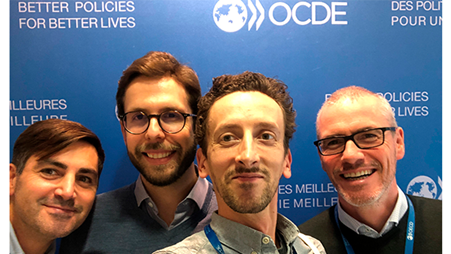
David Howoldt at the OECD for a Research Visit
In the Fall of 2019, RIO PhD Fellow David Howoldt spent four months as a guest researcher at the Science, Technology and Innovation Policy Division at the OECD Directorate for Science, Technology and Innovation (STI) in Paris. During his stay, David joined the OECD team working on the STIP Compass, an initiative by the European Commission and the OECD to collect quantitative and qualitative data on national trends in STI policy. He primarily worked on the data analysis for this current flagship project in the influential OECD STI Directorate.
For more information on STIP Compass
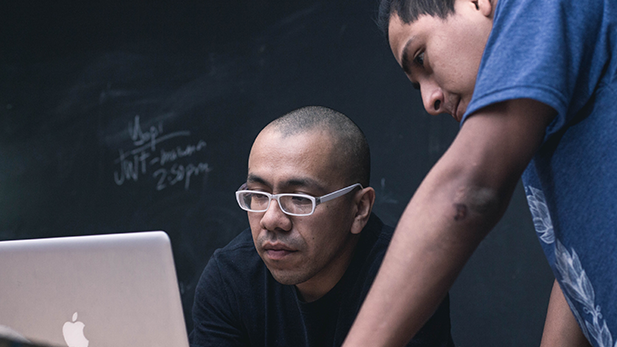
RIO group organizes a PhD course on problem-oriented innovation policy
This course focuses on some of the key organizational dynamics of problem-oriented innovation policy. Societies and economies are today confronted to a series of economic challenges like sustainable economic growth, job-creation, and competitiveness, as well as challenges that have to do with broad social issues like poverty, ageing societies, deforestation, neglected diseases, or climate change. Several countries have started to introduce elements of problem-oriented approach into the formulation and implementation of their research and innovation policies. However, we still lack a proper framework to analyze such trends and dynamics, as well as to understand the transformative capacity and organizational dilemmas associated to such policy initiatives. This course aims at presenting and discussing the newest and most relevant theoretical, conceptual and analytical frameworks to study such fundamental policy approach and the organizational dynamics associated to it.
Teachers of the course: Charles Edquist, Alan Irwin, Susana Borras, Signe Vikkelsø and Christoph Grimpe.
Dates: 9th-13th December 2019.
Location: Copenhagen Business School
The course is offered in collaboration with EU-SPRI FORUM
For more information, read here
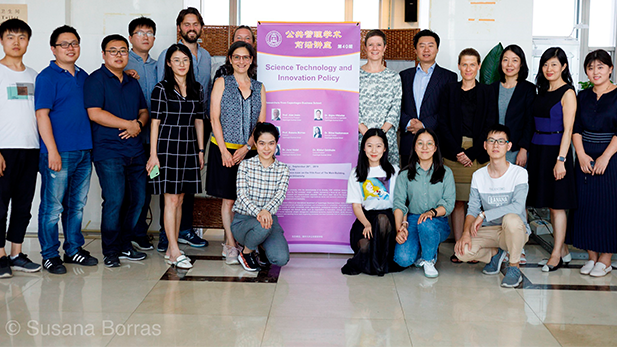
RIO field trip to Beijing, China, September 2019
In September 2019, a small delegation of RIO group members including Susana Borrás, Mikkel Dehlholm, Stine Haakonsson, Jane Bjørn Vedel and Signe Vikkelsøe went on a one-week field trip to Beijing, China. The purpose of the trip was to develop research relationships with Chinese researchers and to collect data for the “Isomorphic Difference” project. The trip included a visit to Huairou Science City which is currently under development and aims to combine large science facilities with unicorn and film industry; a research workshop with researchers and students enrolled in the master degree programs “Innovation Management” and “Public Management and Social Development” at the Sino-Danish Center for education and research; a visit at the Institute of Green Finance which is an independent think tank engaged in increasing profitability of green projects; a visit at the Danish Cultural Center in Beijing that serves as the official platform for the exchange of culture and art; a meeting with key members of CASTED, the Chinese Academy of Science and Technology for Development that provides consultations on national science and technology development strategies; a scientific workshop with leading researchers at the School of Public Policy and Management at the Tsinghua University, and a meeting with Professor Mu Rongping and his research group at the Chinese Academy of Science, Institute of Policy & Management.
Participating members: Susana Borrás, Mikkel Dehlholm, Stine Haakonsson, Jane Bjørn Vedel and Signe Vikkelsø
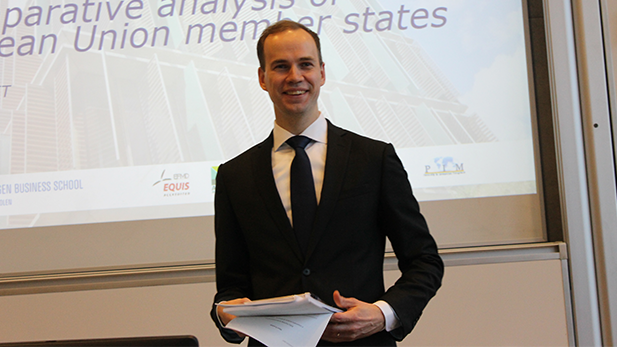
Mart Laatsit's PhD Defence
Mart Laatsit successfully defended his PhD thesis on the 2nd of February 2019. Building on his background as a policy maker, he studied how different sources of information are being used for policy learning. In the context of innovation policy, he looked at both formal and informal sources of learning - such as evaluations vs networks. You can find out more about his work in OpenArchive and in Elsevier Journal. Mart's main supervisor was Susana Borras and the defense committee included Stine Haakonsson (chair), Rainer Kattel and Matthias Weber. Mart remains an active member of the RIO group, while continuing his work on innovation policy at CIRCLE, Lund University.
Contact: Mart Laatsit (email: mla.ioa@cbs.dk)